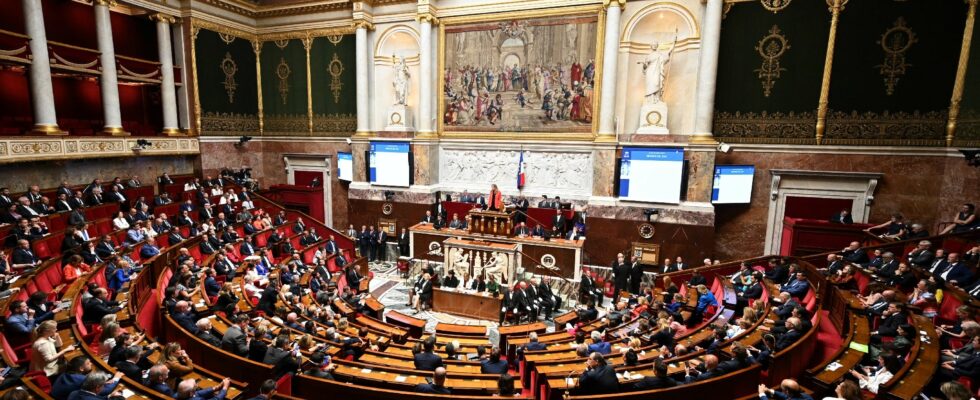The perch no longer being vacant since Thursday evening, and the re-election of Yaël Braun-Pivet, it is now time to distribute key positions. This Friday, July 19, the 577 deputies will elect the members of the bureau of the National Assembly, the highest authority of the Palais Bourbon, composed of twenty-two parliamentarians.
Among the functions that are the subject of much behind-the-scenes negotiation: the quaestorship. It is responsible for the proper management of the financial and administrative services of the lower house.
Places are at a premium. Only three deputies will be able to access this position, which is more than two centuries old, a legacy of the Napoleonic period, shared by the majority and the opposition. Indeed, since 1973, the third seat has been allocated to a member from the minority group. “This allows him to ensure that the two quaestors of the majority do not do just anything,” smiles Florian Bachelier, first quaestor under Emmanuel Macron’s first term (2017-2022).
Thierry Solère, Eric Ciotti… The hiccup of 2017
Until 2017, the quaestors were not elected in plenary session: each group internally designated the MP(s) they wanted to see join the quaestorship. But the outbreak of the right-left divide following the election of Emmanuel Macron disrupted the practices and forced the MPs to vote to designate the three members of the quaestorship. Also, at the time, the leader of the LREM MPs at the time allegedly failed to specify that one of the three seats went to the opposition. “It must be said that with the arrival of 284 first-time elected representatives, amateurism was king,” mocks Jean-Jacques Urvoas, constitutionalist and former MP for Finistère.
The third seat had thus gone to a Macronist deputy, a certain Thierry Solère, leaving Eric Ciotti on the floor. But faced with the outcry from the Republicans, the elected representative from Alpes-Maritimes finally recovered, in January 2018, the position and the many responsibilities that come with it. First and foremost, ensuring the proper use of the funds of the Palais Bourbon.
The financial guardian of the Palais Bourbon
The three quaestors thus filter the slightest expenditure of the institution, and are the only ones able to directly incur expenses. Furthermore, each expenditure must be submitted to their “prior opinion”, according to the formula of article 15 of the regulations of the National Assembly. They also have the heavy task of preparing the budget of the National Assembly.
“Six months before the start of the new year, the services prepare a draft budget that is examined within the framework of a College of Quaestors,” explains Florian Bachelier, who draws attention to the importance of “human relations” for the proper functioning of the quaestorship. “With Laurianne (Rossi, second quaestor of the majority) we got on very well with Eric Ciotti, who is a real hard worker and an excellent technician, so the work was efficient,” he assures.
Administration and human resources
When drawing up the budget, trade-offs can be made, and points are sometimes reworked before the final draft is presented by the First Quaestor to the Bureau of the National Assembly. The latter, led by the President of the Assembly, then votes on the text. But relations can sometimes be complicated between the two leaders. “In general, the First Quaestor finds the President of the National Assembly soft, and the President of the National Assembly finds the First Quaestor turbulent,” summarizes the former MP for Ille-et-Vilaine.
In addition to this budgetary burden, there is also the administrative management and human resources management. This work is of course combined with that of a traditional MP, and takes up an average of one day per week. “It’s still a bit of work: it requires arriving a little earlier, finishing a little later, sometimes cutting back on your time in the constituency,” emphasizes Florian Bachelier, who is trying to deconstruct preconceived ideas about this role.
Allowances, company car, etc.
Because the quaestorship does not grant, according to him, all the privileges that are claimed. “We do not earn 10,000 euros per month, contrary to what I often hear: like any other MP, we receive a little more than 5,000 euros net,” he assures. Indeed, according to the website of the National Assembly, the gross monthly allowances of an MP are €7,637.39. An amount that includes the basic allowance (€5,931.95), the residence allowance (€177.96) and the function allowance (€1,527.48).
But in addition to their elected representatives’ allowances, the three quaestors benefit from a “special allowance” envelope. The highest after that of the President of the National Assembly. This allocation of 5,300.36 euros is used to pay for the organisation of receptions by parliamentarians. “The quaestor is in a way the responsible for the function room, except that these are not parties but meetings,” Florian Bachelier explains.
The latter, however, specifies that he had in his time, with his partner Laurianne Rossi, renounced privileges that he considered outdated. Like that of a company car with driver. And this disappointed by Macronism smiles: “I had made the remark to Eric Ciotti that the only quaestor who was re-elected in 2022 is the one who kept his car and his driver.”
